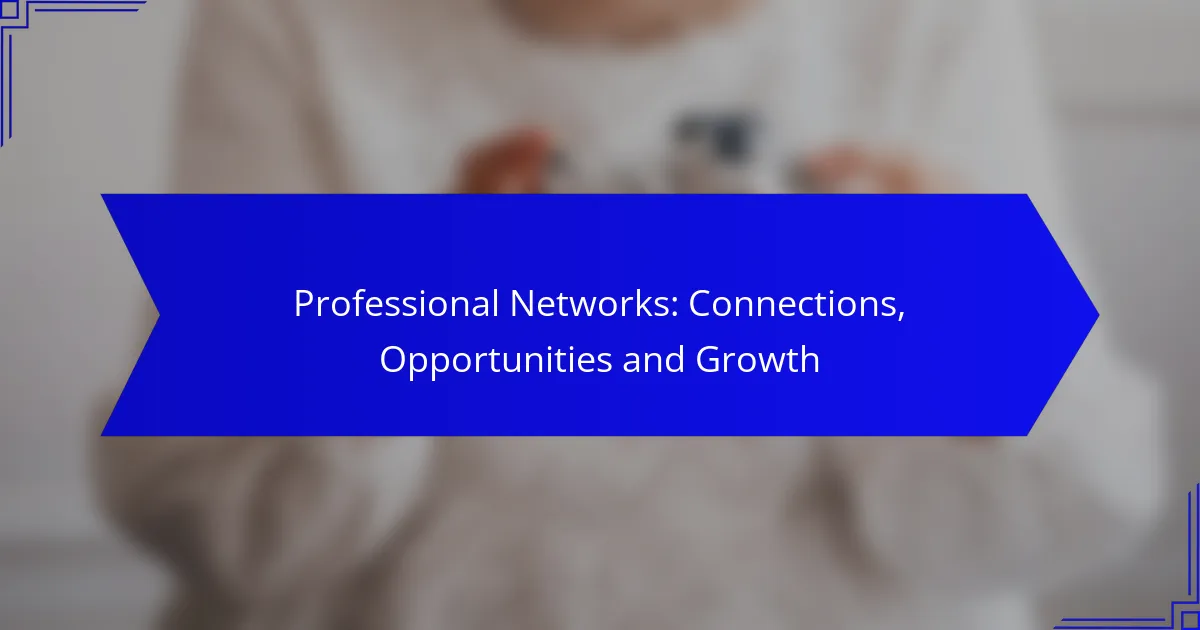Professional networks play a crucial role in advancing careers by connecting individuals with valuable resources and opportunities. By fostering relationships that lead to mentorship, job offers, and collaborative projects, these networks contribute significantly to both personal and professional growth. Engaging with others in your industry, whether online or in-person, is essential for expanding your influence and unlocking new possibilities.

How can professional networks enhance career growth?
Professional networks can significantly enhance career growth by providing access to valuable connections, resources, and opportunities. These networks facilitate relationships that can lead to job offers, mentorship, and collaborative projects, all of which contribute to personal and professional development.
Access to job opportunities
Professional networks often serve as a direct channel to job openings that may not be advertised publicly. Many employers prefer to hire through referrals, making connections within your network crucial for discovering these hidden opportunities.
To leverage this, actively engage with your network by attending events, participating in discussions, and reaching out to contacts. This proactive approach can increase your visibility and likelihood of being recommended for positions.
Skill development through mentorship
Mentorship is a key benefit of professional networks, allowing individuals to learn from experienced professionals in their field. A mentor can provide guidance, share insights, and help you navigate career challenges, ultimately enhancing your skill set.
Seek out mentors by expressing your interest in learning and asking for advice. Establishing a formal or informal mentorship relationship can lead to significant growth in your professional capabilities.
Networking events in major cities
Networking events in major cities are excellent opportunities to meet industry leaders and peers. These gatherings often feature workshops, panels, and informal meet-and-greets, allowing for meaningful interactions and relationship building.
To make the most of these events, prepare by researching attendees, setting specific goals for what you want to achieve, and following up with new contacts afterward. Cities like New York, London, and Berlin frequently host such events, making them prime locations for networking.
Collaboration on projects
Collaborating on projects with peers in your professional network can lead to innovative ideas and shared success. Working together allows you to combine strengths, learn from each other, and expand your portfolio.
Look for opportunities to collaborate by joining group initiatives or proposing joint projects. This not only enhances your skills but also strengthens your relationships within the network.
Industry insights and trends
Being part of a professional network keeps you informed about industry insights and trends that can impact your career. Members often share valuable information about market shifts, emerging technologies, and best practices.
Stay engaged with your network by participating in discussions, attending seminars, and subscribing to relevant publications. This knowledge can position you as a thought leader and help you make informed career decisions.

What are the best professional networking platforms?
The best professional networking platforms facilitate connections, opportunities, and growth in various fields. Each platform serves different purposes, catering to specific networking needs, whether for global outreach or local engagement.
LinkedIn for global connections
LinkedIn is the leading platform for professional networking on a global scale. It allows users to create profiles that showcase their skills, experience, and achievements, making it easier to connect with industry peers, recruiters, and potential clients.
To maximize your LinkedIn presence, regularly update your profile, engage with content relevant to your field, and actively connect with professionals in your industry. Consider joining groups related to your profession to expand your network further.
Meetup for local events
Meetup is designed for organizing and attending local events, making it ideal for face-to-face networking. Users can find groups based on their interests and professions, facilitating connections with like-minded individuals in their area.
To effectively use Meetup, search for groups that align with your career goals and attend events consistently. Engaging in discussions and participating in activities can lead to meaningful relationships and potential collaborations.
Shapr for personalized networking
Shapr is a mobile app that focuses on personalized networking by matching users based on their interests and professional goals. It operates similarly to a dating app, allowing users to swipe through profiles and connect with those who share similar objectives.
To get the most out of Shapr, create a clear and engaging profile that highlights your skills and what you seek in connections. Be proactive in reaching out to matches and initiating conversations to foster valuable relationships.
Alignable for small business connections
Alignable is a networking platform specifically for small business owners, enabling them to connect, collaborate, and support each other. It focuses on local businesses, helping users build relationships that can lead to partnerships and referrals.
To leverage Alignable effectively, engage with your local community by joining discussions and offering support to other businesses. Share your expertise and seek advice, as this reciprocity can strengthen your network and enhance your business opportunities.

How to effectively build a professional network?
Building a professional network involves creating meaningful connections that can lead to new opportunities and personal growth. Focus on engaging with others in your industry, both in-person and online, to expand your reach and influence.
Attend industry conferences
Industry conferences are excellent venues for networking, offering face-to-face interactions with professionals in your field. Prepare by researching attendees and speakers, and set specific goals for whom you want to meet.
During the event, actively participate in discussions and workshops to showcase your expertise. Follow up with contacts after the conference to maintain the connection and explore potential collaborations.
Engage in online communities
Online communities, such as forums and professional groups, provide platforms for networking without geographical limitations. Join relevant groups on platforms like LinkedIn or specialized forums related to your industry.
Contribute valuable insights and answer questions to establish your presence. Regular engagement can lead to connections that may not be possible through traditional networking methods.
Leverage social media platforms
Social media platforms like LinkedIn, Twitter, and Facebook can be powerful tools for building a professional network. Use these platforms to share industry-related content, connect with peers, and follow thought leaders.
Be proactive in reaching out to individuals you admire or want to collaborate with. Personalize your messages to increase the likelihood of a positive response and foster genuine relationships.
Follow up with new contacts
Following up with new contacts is crucial for solidifying your professional network. Send a brief message expressing your appreciation for the conversation and suggesting ways to stay in touch.
Consider scheduling a coffee chat or a virtual meeting to discuss mutual interests further. Consistent follow-ups can transform initial meetings into lasting professional relationships.

What criteria should you consider when choosing networking events?
When selecting networking events, consider factors such as industry relevance, location accessibility, and the size and format of the event. These criteria will help ensure that the connections you make are valuable and that the event meets your professional goals.
Relevance to your industry
Choosing events that are relevant to your industry is crucial for maximizing networking opportunities. Look for events that feature speakers, topics, and attendees aligned with your field. This relevance increases the likelihood of meeting potential collaborators, mentors, or clients who share similar interests and goals.
For example, if you work in technology, attending a tech conference or a local meet-up focused on innovation can connect you with industry leaders and peers. Consider the specific niche within your industry to further refine your choices.
Location accessibility
Location plays a significant role in your ability to attend networking events. Assess whether the venue is easily reachable by public transport or if parking is available. Events in major cities may offer more opportunities but can also involve higher travel costs and time commitments.
For local events, consider those held in community centers or coworking spaces that are convenient for your daily routine. If traveling is necessary, weigh the costs against the potential benefits of the connections you hope to make.
Event size and format
The size and format of an event can greatly influence the networking experience. Smaller gatherings often allow for more intimate conversations and meaningful connections, while larger conferences may provide a broader range of contacts but can feel overwhelming.
Consider whether you prefer structured formats, such as panel discussions and workshops, or informal settings like mixers and roundtables. Each format offers different networking dynamics, so choose based on your comfort level and networking objectives.

What are the unique benefits of local networking?
Local networking offers distinct advantages that can significantly enhance professional growth and opportunities. By connecting with individuals in your immediate area, you can access resources, knowledge, and collaborations that are tailored to your local market.
Stronger community ties
Building relationships within your local community fosters a sense of belonging and trust. These connections often lead to referrals and recommendations, as people are more likely to support those they know personally. Engaging with local organizations or events can strengthen these ties.
Access to localized opportunities
Local networking provides access to job openings, partnerships, and events that are specific to your region. Many opportunities are shared informally within networks, making it essential to be active in local groups. Attending meetups or workshops can help you stay informed about these localized prospects.
Tailored resources and support
Networking locally allows you to tap into resources that are relevant to your area’s economic landscape. This can include mentorship from experienced professionals, workshops focused on local industry trends, or access to funding sources specific to your region. Leveraging these resources can enhance your professional development.
Enhanced collaboration potential
Collaborating with local professionals can lead to innovative projects and initiatives. When you network within your community, you are more likely to find partners who share similar goals and values. This synergy can result in successful ventures that benefit all parties involved.
